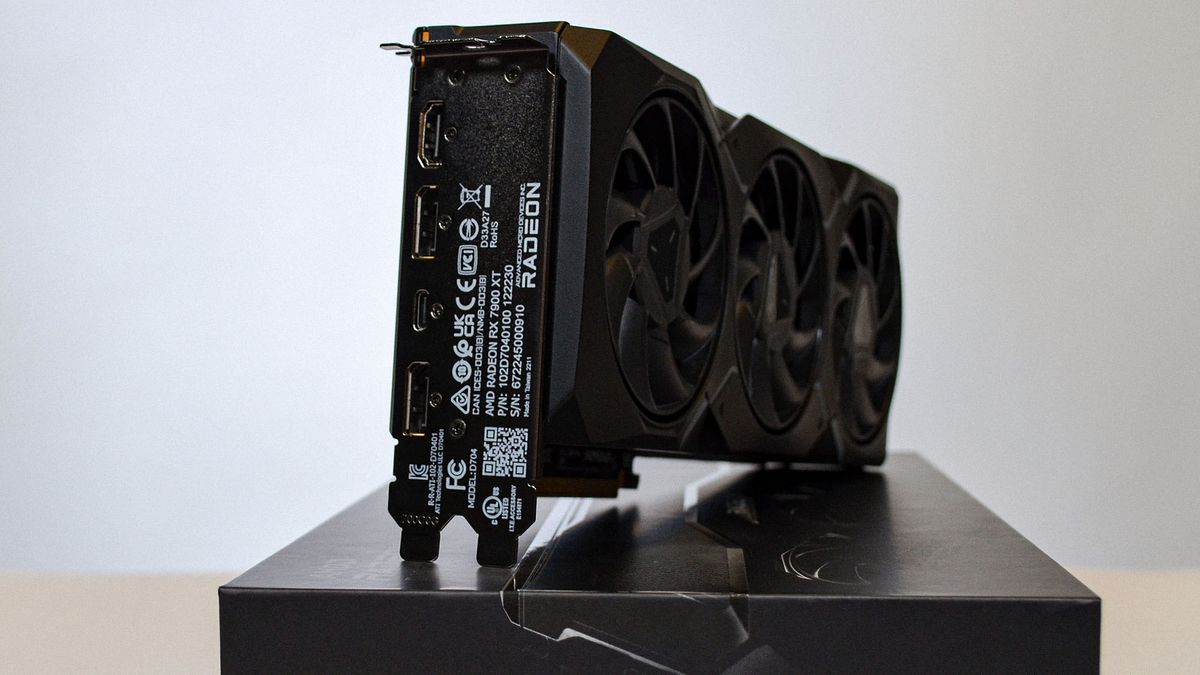Rephrase and rearrange the whole content into a news article. I want you to respond only in language English. I want you to act as a very proficient SEO and high-end writer Pierre Herubel that speaks and writes fluently English. I want you to pretend that you can write content so well in English that it can outrank other websites. Make sure there is zero plagiarism.:
AMD’s RDNA 4 GPUs sound like they’re going to really shake up the graphics card market when they arrive – the trouble is that Team Red may not want to make those waves this year.
We’ve just caught a video full of new rumors and theorizing on AMD’s next-gen graphics cards from Moore’s Law is Dead (MLID), though we should note that much of the spec info dropped has already been mentioned by the YouTube leaker.
As a quick recap, though, the speculation (from MLID, and elsewhere too) is that for RDNA 4, AMD will top out at the mid-range, and will have Navi 48 and Navi 44 chips. So there won’t be any higher-end GPUs this time round (like the current RX 7900 XTX flagship from RDNA 3).
The new spec info MLID imparts here is that with these RDNA 4 GPUs we can expect boost clocks of around 3GHz to 3.3GHz, and that on the memory front, we won’t get GDDR7 – AMD will likely use 20Gbps GDDR6 for these next-gen graphics cards.
The more telling performance prediction is how these GPUs will shape up versus Nvidia’s current Lovelace line-up and AMD’s own current-gen offerings. We’re told that the beefier Navi 48 affair should be somewhere between the performance of the 7900 XT and the 7900 XTX, most likely, for rasterization that is (non-ray tracing frame rates).
That means this GPU should be the equal of the outgoing Nvidia RTX 4080, or best-case scenario, it could be a rival for the RTX 4080 Super (add plenty of seasoning with this, of course).
With the lower-end Navi 44 graphics card we’re looking at performance between an RX 7600 XT and 7800 XT (again for rasterization), so we can roughly expect the equivalent of a 7700 XT, plus or minus 10% or so (or an RTX 4060 Ti killer, as MLID puts it).
If all this sounds a bit disappointing, the real key here will, of course, be the value proposition. AMD is going to make the price/performance ratio more compelling – this is the central idea with RDNA 4 – and we can expect some temptingly priced GPUs with a great shot at getting onto our list of the best graphics cards.
In fact, MLID contends that the worst-case scenario is that AMD’s Navi 48 offering will provide the performance of an RTX 4070 Ti Super for a few hundred dollars less than what Nvidia charges for this new GPU. As mentioned, the best-case scenario might be an RTX 4080 Super equivalent, theoretically at something like half the price.
The likelihood, though, is somewhere in between, but the long and short of it is that these RDNA 4 graphics cards are set to really punch above their weight in terms of value for money at the mid-range. MLID sums it up as a 30% boost in price/performance across the board for AMD’s next gen GPUs.
Note that we’re talking purely about rasterization performance here, and MLID doesn’t have any specifics with ray tracing chops. MLID says we can expect some improvement on RDNA 3 with ray tracing – obviously that must be the case – but AMD won’t be matching Nvidia yet. It won’t be until RDNA 5 that Team Red really pushes hard with ray tracing, apparently.
However, what might be the real disappointment here is that we could be in for a longer wait than expected for these next-gen GPUs from AMD. Let’s chew over that a bit more in the next section.
Analysis: Forget that rumored 2024 launch?
MLID has tapped some of his best sources for RDNA 4 release date info, and those insiders have different stories to tell in many respects. One source says progress with driver development is going very well, and to expect a Q3 2024 launch, as has been previously rumored.
The other sources indicate that it’s possible AMD could launch RDNA 4 this year, maybe in Q3, or perhaps Q4, but that Team Red might hold off until the start of 2025. Why? Because of two main reasons…
Firstly, Nvidia supposedly only has the RTX 5090 coming late in 2024, and no other Blackwell graphics cards until 2025. So there’ll be no rival for Navi 48 until next year, and no need to respond to the 5090, which will be well out of RDNA 4’s league.
The other reason is that AMD’s current-gen RDNA 3 graphics cards are selling well, and pushing out RDNA 4 this year could cannabilize those sales. So, if AMD can get more mileage out of sales of RX 7900, 7800 and 7700 series graphics cards, why wouldn’t it, with no pressure coming from Nvidia?
As long as RDNA 3 sales continue to be strong for AMD going into the middle of this year and beyond – and price cuts appear to be maintaining unit-shifting momentum nicely – we can’t see any reason why Team Red wouldn’t prefer to keep RDNA 4 in the wings, given the overall state of the GPU market, and Nvidia’s likely launch timings.
This is just theorizing, mind, and AMD may still go with a later in 2024 launch – especially if Nvidia’s launch plans are switched up, or the balance of GPU power shifts in other ways. But from the picture that’s currently being painted, we’re thinking more Q4 than Q3 at this point, if RDNA 4 does turn up this year, and it may not, reading between the lines…








